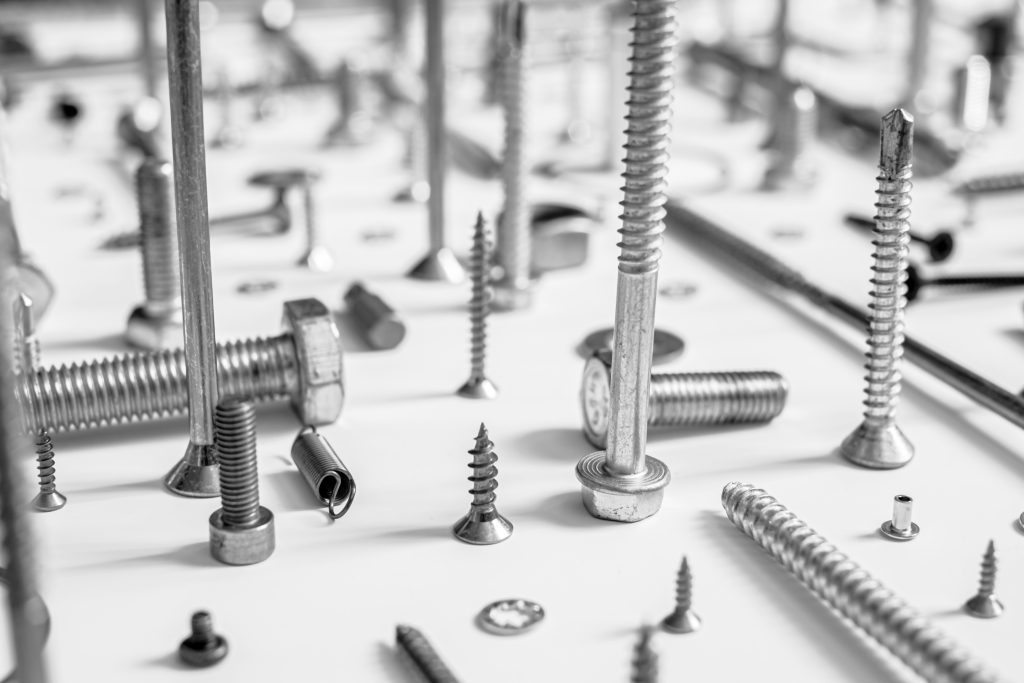When it comes to construction and assembly, choosing the right fastener can make all the difference. Bolts and screws are two of the most common fasteners used in construction and assembly projects. While they may look similar, they have distinct differences that make them better suited for certain applications. In this article, we will explore the differences between bolts and screws and when to use each one.
At Fastening Specialists, we understand that choosing the right fastener can be overwhelming. With over 65 years of experience as a trusted wholesale distributor, we are the specialists you can trust for all your fastening needs. We offer a wide range of fasteners in various sizes, materials, and designs to ensure that you find the perfect fit for your project. Our expertise in code compliance and order fulfillment ensures that you get the best value and insight for your investment.
Types of Bolts and Screws
When it comes to fastening components and joining materials, bolts and screws are two of the most commonly used fasteners. Bolts are typically used for one of two reasons: where disassembly might be necessary or where a secure and adjustable connection is needed. Screws, on the other hand, are used to fasten components and join materials such as wood, metal, and plastic.
Machine Screws
Machine screws are commonly used in machinery and electronics. They have a uniform diameter along the entire length of the shaft and are typically threaded all the way to the head. Machine screws come in a variety of head types, including flat, round, pan, and oval. They are usually made of steel, stainless steel, or brass.
Wood Screws
Wood screws are designed to join two pieces of wood together. They have a tapered shaft with deep threads that help to grip the wood and prevent it from splitting. Wood screws come in a variety of head types, including flat, round, and oval. They are usually made of steel or brass.
Sheet Metal Screws
Sheet metal screws are designed to join thin sheets of metal together. They have a sharp point and a tapered shaft with threads that are spaced farther apart than those on wood screws. Sheet metal screws come in a variety of head types, including flat, pan, and oval. They are usually made of steel, stainless steel, or brass.
Lag Bolts
Lag bolts, also known as lag screws, are used to join heavy pieces of wood or metal together. They have a thick, sturdy shaft with deep threads that help to grip the material and prevent it from pulling apart. Lag bolts come in a variety of head types, including hex, round, and square. They are usually made of steel or stainless steel.
We understand that choosing the right fastener for your project can be overwhelming. As specialists in this field, we offer a wide range of sizes, applications, features, designs, materials, coatings, and SKU names to meet your needs. Serving a long list of industries, you can trust us for the best in product value, insight, code expertise, and order fulfillment.
Understanding Threads and Fastening Mechanics
When it comes to fastening two or more objects together, bolts and screws are the go-to options. Understanding the mechanics behind these fasteners is crucial to ensure a secure and long-lasting joint. In this section, we’ll cover the basics of threads, nut and bolt pairing, torque, and tension.
Thread Patterns
Threads are the helical ridges on the shank of a bolt or screw that allow it to be screwed into a threaded hole or tapped hole. There are several types of thread patterns, including coarse, fine, and metric. Coarse threads have fewer threads per inch, making them faster to install but less precise. Fine threads have more threads per inch, providing greater precision but slower installation. Metric threads are commonly used in Europe and Asia, while coarse and fine threads are more common in North America.
Nut and Bolt Pairing
When selecting nuts and bolts, it’s important to ensure that they are compatible in terms of size, thread pattern, and material. Using mismatched nuts and bolts can result in a weak joint that is prone to failure. It’s also important to ensure that the bolt is long enough to provide sufficient thread engagement, but not so long that it bottoms out in the tapped hole.
Torque and Tension
Torque is the force applied to a bolt or nut to tighten it. The amount of torque required depends on the size and material of the bolt, as well as the type of joint being fastened. Over-tightening can lead to damage or failure of the joint, while under-tightening can result in a weak joint that is prone to loosening. Tension is the force applied to the bolt itself as it is tightened. The amount of tension required depends on the size and material of the bolt, as well as the type of joint being fastened. Proper tension is essential for a strong and secure joint.
Materials and Coatings
When it comes to choosing the right fastener for your project, the material and coating are essential factors to consider. Fasteners come in a variety of materials, each with its unique properties, advantages, and disadvantages. In this section, we will discuss the most common materials and coatings used in fasteners.
Metal Fasteners
Metal fasteners are the most commonly used type of fasteners. They are strong, durable, and can withstand high forces. The most popular metal fasteners are made of stainless steel, steel, bronze, and brass.
Stainless Steel
Stainless steel is a corrosion-resistant material that is perfect for use in harsh environments. It is strong, durable, and can withstand high temperatures. Stainless steel fasteners are ideal for outdoor applications, marine environments, and food processing facilities.
Steel
Steel is the most commonly used material for fasteners. It is strong, durable, and affordable. Steel fasteners are suitable for a wide range of applications, including construction, automotive, and machinery.
Bronze and Brass
Bronze and brass are non-ferrous materials that are used in fasteners for their corrosion resistance and aesthetic appeal. Bronze fasteners are suitable for marine environments, while brass fasteners are used in electrical and plumbing applications.
Non-Metal Fasteners
Non-metal fasteners are used in applications where metal fasteners are not suitable. They are lightweight, non-corrosive, and have excellent insulating properties. The most popular non-metal fasteners are made of nylon.
Nylon
Nylon is a synthetic material that is lightweight and durable. Nylon fasteners are commonly used in electrical and automotive applications because of their excellent insulating properties.
Protective Coatings
Protective coatings are applied to fasteners to protect them from corrosion, wear, and tear. The most popular protective coatings are zinc, chrome, and black oxide.
Zinc
Zinc is one of the most popular coatings for fasteners. It is relatively inexpensive and provides excellent corrosion resistance. Zinc-coated fasteners are perfect for humid environments.
Chrome
Chrome is a decorative coating that is used in fasteners for its aesthetic appeal. Chrome-coated fasteners are commonly used in automotive and motorcycle applications.
Black Oxide
Black oxide is a coating that provides excellent corrosion resistance and wear resistance. Black oxide-coated fasteners are commonly used in industrial and military applications.
Fastening Specialists is your trusted wholesale distributor for all your fastening needs. With over 65 years of experience in the industry, we are specialists in this field. We offer a wide range of fasteners in different sizes, materials, and coatings to meet your specific needs. Our team of experts is always ready to provide you with the best product value, insight, code expertise, and order fulfillment. Trust the specialists for all your fastening needs.
Tools and Installation Techniques
When it comes to installing bolts and screws, having the right tools and techniques can make all the difference. In this section, we’ll cover some of the essential tools and techniques you need to know.
Screwdrivers and Wrenches
Screwdrivers and wrenches are the most common tools used for installing bolts and screws. A screwdriver is used to turn screws, while a wrench is used to turn bolts. There are different types of screwdrivers and wrenches available, each designed for specific applications. For instance, a Phillips screwdriver is used for Phillips head screws, while a flathead screwdriver is used for slotted screws. Wrenches come in different sizes and shapes, including open-end wrenches, box-end wrenches, and adjustable wrenches.
Pilot Holes and Anchors
Pilot holes and anchors are essential for ensuring that screws and bolts are securely fastened. A pilot hole is a small hole drilled into the material before the screw or bolt is inserted. This helps prevent the material from splitting or cracking when the screw or bolt is tightened. Anchors are used when screws or bolts need to be inserted into materials that cannot support the weight of the screw or bolt on their own. There are different types of anchors available, including screw anchors, bolt anchors, and expansion anchors.
Power Tools for Efficiency
Power tools can help make the installation of bolts and screws faster and more efficient. There are different types of power tools available, including drills, impact drivers, and power screwdrivers. Drills are used for drilling pilot holes, while impact drivers and power screwdrivers are used for driving screws and bolts into materials. Power tools can be especially helpful when working with harder materials, such as metal or hardwood.
Selecting the Right Fastener for the Job
When it comes to selecting the right fastener for your project, there are several factors to consider. Here are some key considerations to keep in mind:
Load-Bearing Considerations
The amount of load and pressure that the fastener will be subjected to is an important factor to consider. If the fastener will be holding heavy loads, you’ll want to choose a fastener with a high holding power. For heavy-duty construction projects, machine bolts are a good option as they are available in larger sizes and can handle heavier loads.
Environmental Factors
Environmental factors can also play a role in selecting the right fastener. If the fastener will be exposed to moisture or other corrosive elements, you’ll want to choose a fastener made from a material that can withstand these conditions, such as stainless steel or brass. For outdoor projects, consider using galvanized fasteners, which are coated to resist rust and corrosion.
Aesthetic Choices
While the functionality of the fastener is important, it’s also important to consider the aesthetic of your project. For example, if you’re working on a DIY project where the fasteners will be visible, you may want to choose a decorative screw or bolt that complements the overall look of the project.
As a construction pro or DIY enthusiast, you know that choosing the right fastener for the job is critical. With so many options available, it can be overwhelming to navigate the world of fasteners. That’s where Fastening Specialists comes in. We offer a wide range of fasteners in various sizes, materials, and coatings to suit any application. Our expert team can provide you with product value, insight, code expertise, and order fulfillment. Trust THE specialists for all your fastening needs.
The team at fastening specialists provides advice and best use-cases, but always check with local building codes and engineers for correct usage instructions.

